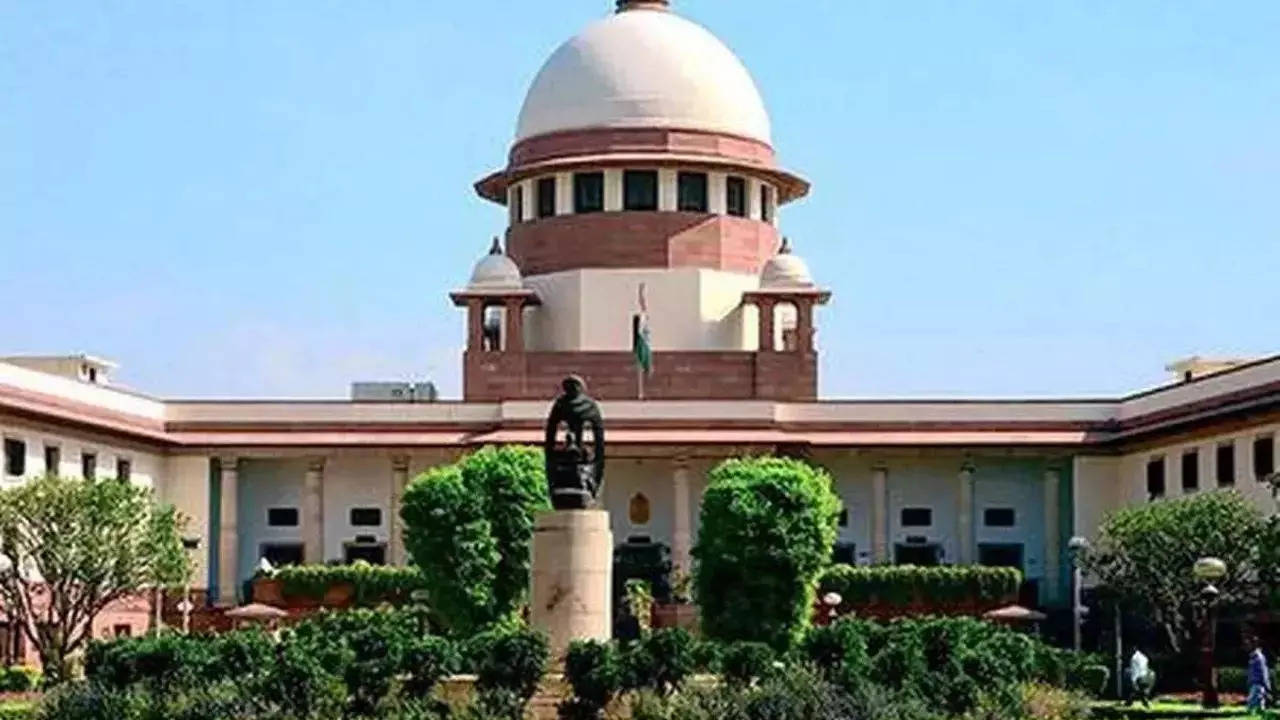NEW DELHI: The Supreme Court on Tuesday said that the Bombay high court ruling in actress Rhea Chakraborty’s case — that giving money to a person for procuring drugs would not mean encouraging illicit trafficking — would not be considered as a precedent while allowing the Narcotics Control Bureau (NCB)’s plea not to challenge the bail granted to her.
At the outset of the hearing on the NCB’s appeal, additional solicitor general S V Raju told an apex court bench comprising Justices A S Bopanna and M M Sundresh that the government was not challenging Chakraborty’s bail and that the legal issue regarding interpretation of Section 27A of the Narcotics Drugs and Psychotropic Substances (NDPS) Act be left open for a decision at a later stage.
The central agency disagreed with the HC’s interpretation of Section 27A (under which one can be jailed for a maximum of 20 years for financing illicit drug trafficking and harbouring offenders) and urged the court the ruling should not be treated as precedent by other courts.Allowing the NCB’s plea, the bench said, “At this stage, the challenge to the impugned order in so far as grant of bail may not be required. However, the question of law raised isleft open to be considered in an appropriate case and, as such, the judgment may not be treated as precedent in any other case.” Rhea Chakraborty and others, including her brother Showik Chakraborty, were accused of having facilitated procurement of drugs for late actor Sushant Singh Rajput who died under mysterious circumstances. She was arrested on September 8, 2021, and got bail on October 4, 2021.
While granting relief to the actress, the HC had pointed to the anomaly in Section 27A as the punishment for consumption of narcoticdrugs was a maximum one year or imposition of fine up to Rs 20,000 but if some other person, such as a friend or a relative, paid for such drugs, the person who actually consumed the drug would be punished only with imprisonment up to one year but the person who paid for the drugs would face the prospect of spending 20 years in jail.
“ I am unable to agree with the submission that giving money to another for consuming drugs would mean encouraging such a habit and would mean ‘financing’ or ‘harbouring’ as envisaged under Section 27A of the NDPS Act,” the HC had said.“I am satisfied that there are reasonable grounds for believing that the applicant is not guilty of any offence punishable under Sections 19, 24 or 27A or any other offence involving commercial quantity. There are no other criminal antecedents against her. She is not part of the chain of drug dealers. She has not forwarded the drugs allegedly procured by her to somebody else to earn monetary or other benefits. Since she has no criminal antecedents, there are reasonable grounds for believing that she is not likely to commit any offence while on bail,” Justice Sarang V Kotwal had said in his verdict.
At the outset of the hearing on the NCB’s appeal, additional solicitor general S V Raju told an apex court bench comprising Justices A S Bopanna and M M Sundresh that the government was not challenging Chakraborty’s bail and that the legal issue regarding interpretation of Section 27A of the Narcotics Drugs and Psychotropic Substances (NDPS) Act be left open for a decision at a later stage.
The central agency disagreed with the HC’s interpretation of Section 27A (under which one can be jailed for a maximum of 20 years for financing illicit drug trafficking and harbouring offenders) and urged the court the ruling should not be treated as precedent by other courts.Allowing the NCB’s plea, the bench said, “At this stage, the challenge to the impugned order in so far as grant of bail may not be required. However, the question of law raised isleft open to be considered in an appropriate case and, as such, the judgment may not be treated as precedent in any other case.” Rhea Chakraborty and others, including her brother Showik Chakraborty, were accused of having facilitated procurement of drugs for late actor Sushant Singh Rajput who died under mysterious circumstances. She was arrested on September 8, 2021, and got bail on October 4, 2021.
While granting relief to the actress, the HC had pointed to the anomaly in Section 27A as the punishment for consumption of narcoticdrugs was a maximum one year or imposition of fine up to Rs 20,000 but if some other person, such as a friend or a relative, paid for such drugs, the person who actually consumed the drug would be punished only with imprisonment up to one year but the person who paid for the drugs would face the prospect of spending 20 years in jail.
“ I am unable to agree with the submission that giving money to another for consuming drugs would mean encouraging such a habit and would mean ‘financing’ or ‘harbouring’ as envisaged under Section 27A of the NDPS Act,” the HC had said.“I am satisfied that there are reasonable grounds for believing that the applicant is not guilty of any offence punishable under Sections 19, 24 or 27A or any other offence involving commercial quantity. There are no other criminal antecedents against her. She is not part of the chain of drug dealers. She has not forwarded the drugs allegedly procured by her to somebody else to earn monetary or other benefits. Since she has no criminal antecedents, there are reasonable grounds for believing that she is not likely to commit any offence while on bail,” Justice Sarang V Kotwal had said in his verdict.
#Supreme #Court #Rhea #bail #final #NCB #tells #Supreme #Court #wont #appeal #India #News


Leave a Reply